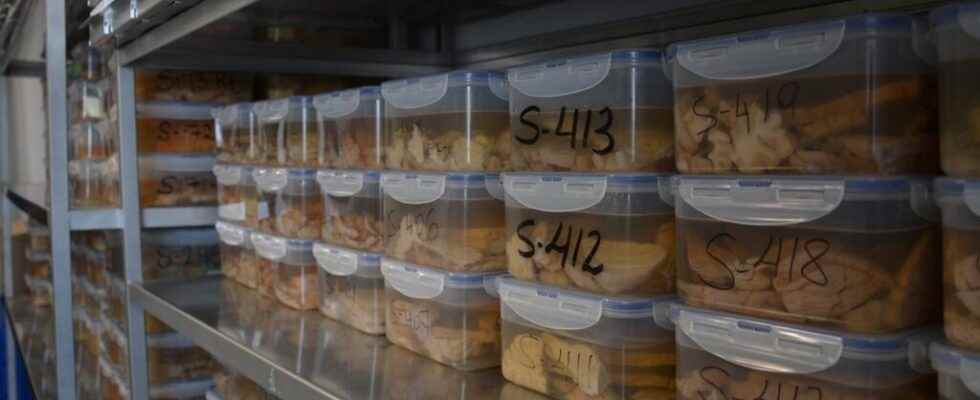Canada’s largest brain bank provides samples to researchers around the world. Taken from the deceased who suffered from mental disorders, the brains are also studied on site. They provide a better understanding of the biological mechanisms at work in a wide variety of neurological diseases, including depression.
From our correspondent in Montreal,
On the fourth floor of the Douglas Research Center, in the heart of Montreal, Éric opens a double door with a big smile. The handyman at the center specializing in mental health research does not often have the opportunity to enter this sector, he says. Before us opens a long corridor. On the walls, neurons are painted in all colors. On the left, five locked doors: these give access to the treasure of the university center.
With a beep, one of these doors opens into a small room. Plastic boxes filled with a yellowish liquid, formalin, which preserves cut-outs of human brains, are stored on a shelf. Facing them are refrigerators with billboards reading “-79 degrees”. Inside, other cuts of brains are stored. Behind the shocking aspect of this scene, a hope: to better understand the seat of our emotions, to better treat and support people suffering from mental disorders.
Thousands of brains
Gustavo Turecki sits straight in his chair. In a corner of the office, many scientific awards are on display. In his fifties, with a piercing gaze and a calm voice, the co-director of Canada’s largest brain bank explains the raison d’être of his institution: ” The bank is a collection of brain tissue from people who have died. Some had brain problems, some didn’t. The goal is to better understand the least well-known organ of our body. »
With more than 3,600 brains, the Montreal Brain Bank is one of the largest banks in the world. Each year, it provides more than a thousand brain tissue samples to researchers around the world, from Japan to Australia, including the United States and Europe.
For obvious ethical reasons, it is impossible to directly study human brains in action: open-skull operations, which are dangerous, are not only used to try to treat an individual. The only way to have access to a brain is therefore to obtain it from a donation, decided before or after death.
Ethical issues
As a general rule, the brain should be removed no more than 24 hours after death, to prevent decomposition from damaging the tissues. A constraint that sometimes puts Gustavo Turecki’s team in a delicate situation. ” If the person has not accepted or refused organ donation during his lifetime, you must speak within 24 hours with the family to find out if they accept that the deceased’s brain be removed. Part of the team is dedicated to it, because you have to be tactful “, explains the researcher.
These precious organs are then cut into slices of one to two centimeters, then stored, waiting to be studied. Researchers who ask to obtain brain samples are then strictly supervised. They must submit a formal request to their ethics committee, fulfill a certain number of criteria… Once validated, the request is studied and approved in turn by the brain bank. How are samples sent? ” By FedEx. This is not a joke ! Even if, of course, there is a whole procedure with customs to send biological material “replies, amused, Gustavo Turecki.
studying depression
The researcher is himself a beneficiary of this bank. Gustavo Turecki works specifically on the influence of trauma on the functioning of our brain, in particular how the social environment can interact with the genome and increase the risk of depression or suicide.
Congratulations to Dr. Gustavo Turecki and his team at the Douglas – Bell Canada Brain Bank, one of the largest banks of its kind in the world, who received a grant totaling $2M from the Brain Canada Foundation. https://t.co/fctTKJFikp pic.twitter.com/D5Rm6ClaRq
— McGill Medicine and Health Sciences (@McGillMed) March 19, 2021
It has long been known that our social experiences influence these phenomena. Only, the neuroscientist discovered that these can also directly influence the functioning of the brain, and plunge it into this depressive state: “ Our research has shown that an individual’s traumatic experience early in life will impact brain structures that are important in regulating the stress response. »
These studies have enormous potential for people with depression. “ What pushes me is to understand how the brain works, and what happens in someone who is depressed. If we can understand and better deal with what happens when we are depressed, we can help a lot of people hopes the researcher.
The brains stored by the Douglas Research Center bank are analyzed more and more finely. Research is progressing rapidly, explains Gustavo Turecki: “ There is a revolution in human genome science. Single-cell genomics allows us to study one cell at a time, dissect thousands of cells, interrogate each cell to understand how it behaves, and map organs and how they function in unprecedented ways. “. With, ultimately, the hope of breakthroughs to support people in a state of depression.
